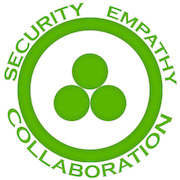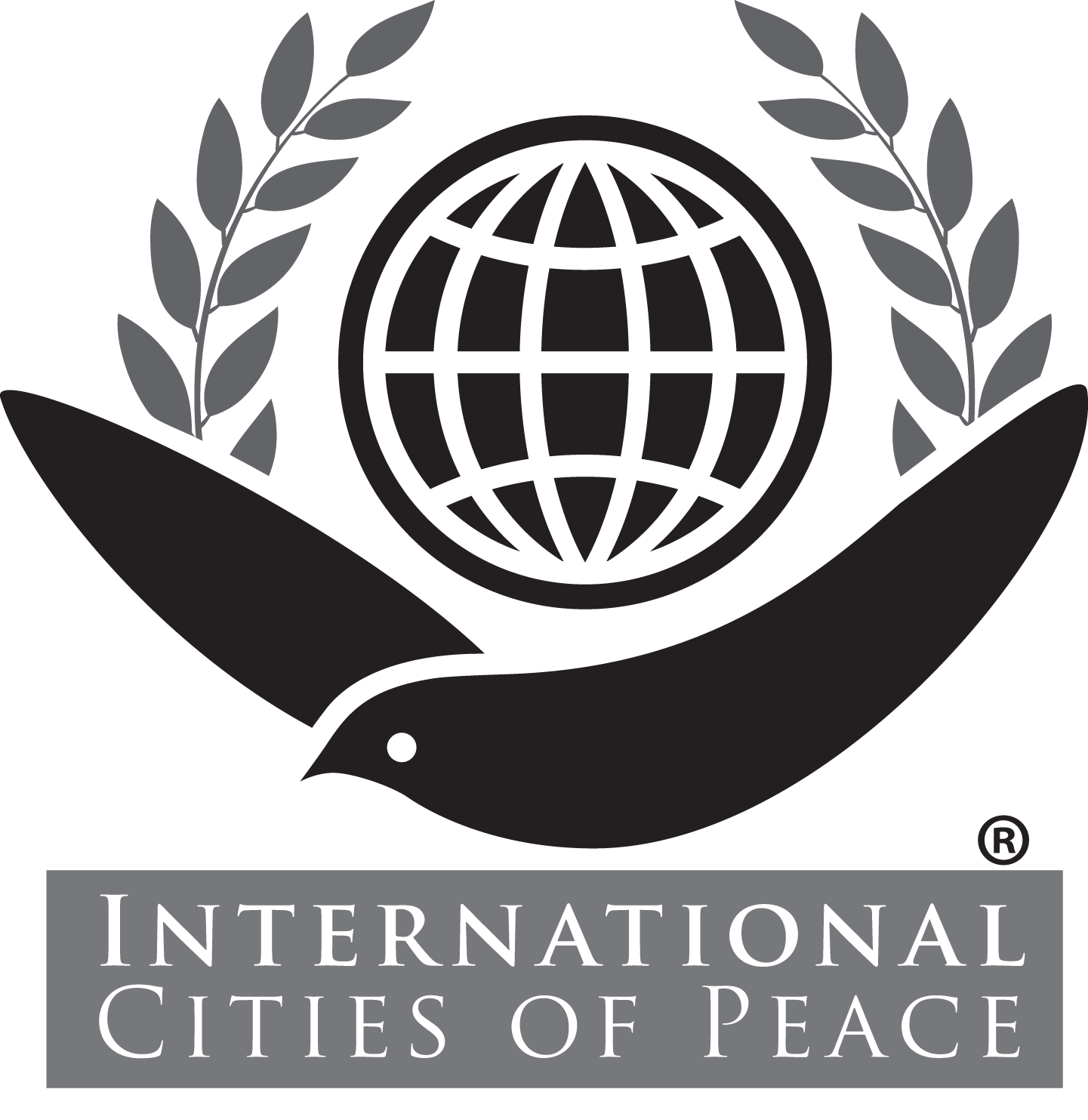Eugene’s Emerald Compassionate Action Network is getting down to the “granular” level for a local culture of peace. The group will site two modular homes on a local property to house families in transition from homelessness. David Hazen is video-interviewing “Upstanding Citizens” and archiving them on the ECAN website, and they are doing a small networking project to create partnerships for the Interfaith Family Shelter program.
Eugene, Oregon, U.S.A.: City of Peace
From the Eugene City of Peace website:
Imagine a City that is vibrating with the spirit of cooperation!
Imagine that in a few years from now, this will be true:
The thought leaders of the community from grassroots peace, environmental and justice groups, Lane Interfaith Alliance, Human Rights Commission, the University, the hospitals, the police, the Chamber of Commerce, and City Council have been meeting for months in conversations that connect with the youth, the elderly, the gays and transgenders, the veterans, the Latinos, the Asians, and Native and African-Americans, using Appreciative Inquiry, World Café, and other peacelearning practices to define commonly held values and principles.
Note: Introduction page with information primarily at the time of joining International Cities of Peace. For updates, please contact the liaison.
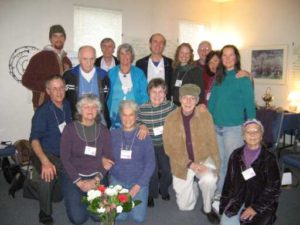
Imagine that from these conversations we develop a stated united purpose and definition of a City of Peace that will be fully funded and supported in public/private partnership to provide experiences that transform every neighborhood of the City, giving voice to the voiceless, tools of self-assessment and right relationship, whereby every child and every adult is unafraid to be seen for who they truly are and are welcoming to all with joy and gratitude for the vitality of the place that Eugene occupies in the ecosystem of this planet and this Universe.
Today, a network of business, government and community leaders is beginning to work to leverage this amazing opportunity. Lately, the Dayton City Commission passed an Immigrant Friendly City resolution to encourage and acknowledge the potential power of recent and future new citizens.
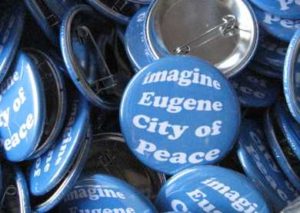
Contact:
FROM FOUNDER DAVID HAZEN ON THE START OF A CITY OF PEACE:
“The idea for a City of Peace in Eugene came from my association with the campaign for a U.S. Department of Peace, organized by The Peace Alliance. From 2005 to 2011 I was the Oregon State Coordinator for that campaign. I began to ask the question, what would a Department of Peace do if it had a local office in Eugene? I discovered that there were many Cities of Peace already established.
I then inventoried more than 90 peace, justice, and sustainability organizations in our community, and 20 of them participated in the Peace Feast and Walk on the anniversary of the Iraq war in March of 2011. I began building a relationship with the Eugene Human Rights Commission and proposed that the city conduct a Peace Index survey to establish a baseline for measuring progress. I also connected with the University of Oregon’s Center for Intercultural Dialogue to present the Charter for Compassion for endorsement by the City.
“Later that year, I was present when the Occupy Eugene organizers set up an agreement with Eugene police for halting arrests for violation of the city’s anti-camping ordinance as long as the Occupy camp remained nonviolent and did not endanger the public. When tensions suddenly arose over an alleged order issued by the Eugene city manager asking the police to enforce the ordinance, a meeting was hurriedly scheduled to head off an angry confrontation. I knew Community Mediation Services (CMS) was the right resource for this situation, so I asked them to facilitate the discussion. I rushed to eat breakfast and make it down to City Hall.
“The conversation between Occupy Eugene, the city manager and the Police Department then went so well that Lauren Regan, the lawyer for the Occupiers later told me that she thought she was dreaming! Sparrow, spokeswoman for the homeless youth, was incredibly eloquent. We met for two hours. Chip Coker and Barbara Daté of CMS facilitated a smooth conversation. Nobody was ever upset. Everyone had a chance to speak.
‘I spoke of my desire for win-win solutions that would be a model for other cities. I was floored when Chief Kerns and City Manager Jon Ruiz used almost the same words! I felt this was a victory of the heart, for it takes genuine courage to focus on everyone, not just some, getting their needs met. Perhaps in this time of crisis, we will finally be motivated to teach ourselves how to communicate with words of inclusion, not exclusion. When there is enough “deep listening” to ourselves and each other, then the questions about how to achieve our mutual goals becomes an effortless dance. It will take some time, some practice, some real effort, and yet if we expand our abilities for peaceful conversation we will have a solid foundation for a City of Peace. What would that mean to you, how would it change your life?”
— David Hazen is the author of Love Always Wins: Hope for Healing the Epidemic of Violence.
ABOUT EUGENE, OREGAN, U.S.A.
Eugene s a major city of the Pacific Northwest located in the U.S. state of Oregon. It is the second-largest city in the state and the county seat of Lane County. It is located at the south end of the Willamette Valley, near the confluence of the McKenzie and Willamette rivers, about 50 miles (80 km) east of the Oregon Coast.
As of the 2010 U.S. Census, Eugene has a population of 156,185, and Lane County (co-located with the Eugene-Springfield Metropolitan Statistical Area) (MSA) has a population of 351,715.[8][9] While Eugene has long been the second-largest city in Oregon, it was briefly surpassed by Salem between 2005 and 2007. The Eugene-Springfield, Oregon MSA is the 144th largest metropolitan statistical area of the U.S., and the third-largest in the state, behind the Portland Metropolitan Area and the Salem Metropolitan Area. The city’s population was estimated by the Portland Research Center to be 159,580 in 2013.
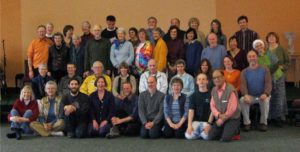
Eugene is noted for its “community inventiveness.” Many U.S. trends in community development originated here. The University of Oregon’s participatory planning process, known as The Oregon Experiment, was the result of student protests in the early 1970s. The book of the same name is a major document in modern enlightenment thinking in planning and architectural circles. The process, still used by the university in modified form, was created by Christopher Alexander, whose works also directly inspired the creation of the Wiki. Some of the research for the book A Pattern Language, which inspired the Design Patterns movement and Extreme Programming, was done by Alexander in Eugene. Not coincidentally, those engineering movements also had origins here. A Pattern Language is the best-selling book on architecture and planning of all time.
In the 1970s, Eugene was packed with cooperative and community projects. It still has small natural food stores in many neighborhoods, some of the oldest student cooperatives in the country, and alternative schools have been part of the school district since 1971. The old Grower’s Market, downtown near the Amtrak depot, is the only food cooperative in the U.S. with no employees. It is possible to see Eugene’s trend-setting non-profit tendencies in much newer projects, such as the Tango Center and the Center for Appropriate Transport. In 2006, an initiative began to create a tenant-run development process for downtown Eugene.
In the fall of 2003, neighbors noticed that “an unassuming two-acre remnant orchard tucked into the Friendly Area Neighborhood” had been put up for sale by its owner, a resident of New York City. Learning that a prospective buyer had plans to build several houses on the property, they formed a nonprofit organization called Madison Meadow in June 2004 in order to buy the property and “preserve it as undeveloped space in perpetuity.”[49] In 2007 their effort was named Third Best Community Effort by the Eugene Weekly,[51] and by the end of 2008 they had raised enough money to purchase the property.
The City of Eugene has an active Neighborhood Program. Several neighborhoods are known for their green activism. Friendly Neighborhood has a highly popular neighborhood garden established on the right of way of a street never built. There are a number of community gardens on public property. Amazon Neighborhood has a former church turned into a community center. Whiteaker hosts a housing co-op that dates from the early 70’s that has repurposed both their parking lots into food production and play space. An unusual eco village with natural building techniques and large shared garden can be found in Jefferson Westside neighborhood. A several block area in the River Road Neighborhood is known as a Permaculture hotspot with an increasing number of suburban homes trading grass for garden, installing rain water catchment systems and food producing landscapes and solar retrofits. Several sites have planted gardens by removing driveways. A 65 tree filbert grove on public property is being restored by citizen volunteers in cooperation with the city of Eugene. There are deepening social and economic networks in the neighborhood.
Note: If information or photos used here are copyrighted, please contact us and we will immediately delete the copyrighted material.
DO YOU THINK YOUR COMMUNITY CAN BE A CITY OF PEACE?
SEND AN EMAIL!
